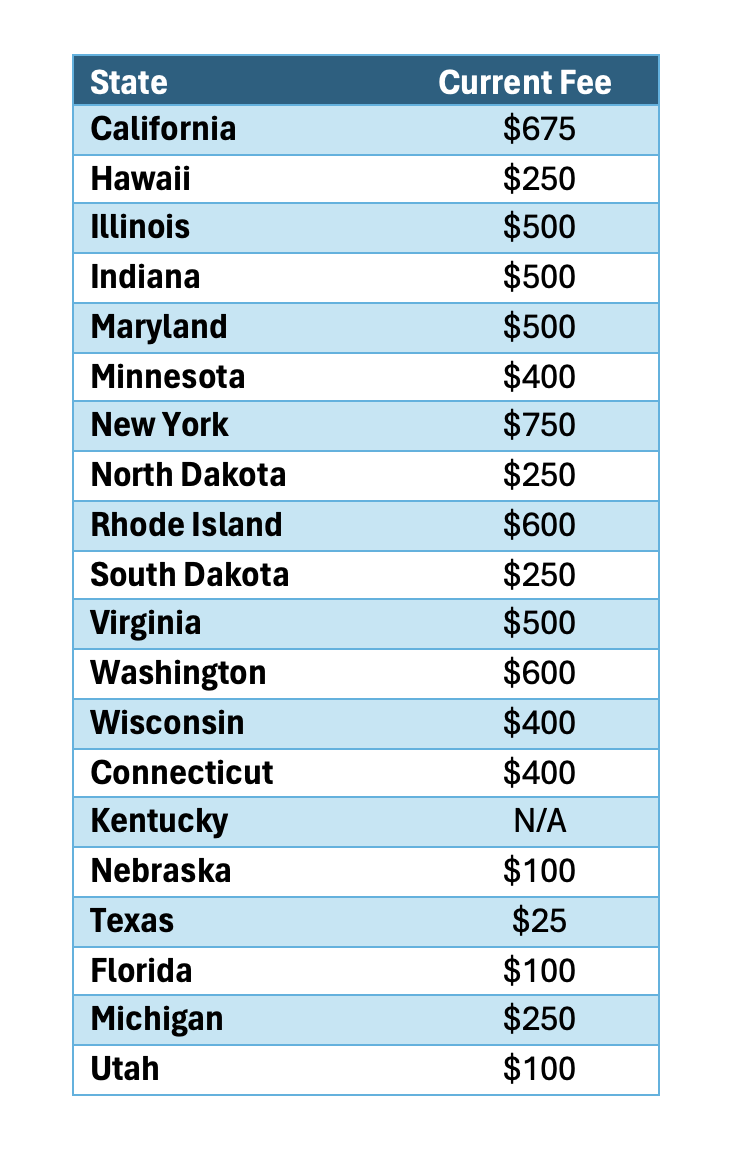The Legal Definition of a Franchise
Interested in franchising, licensing, or some other business relationship? The first step is to understand the legal definition of a franchise.
Franchising generally occurs any time there is an oral or written agreement for (1) the buyer to use or associate with the sellers trademark; (2) the seller to exert certain control or provide certain assistance; and, (3) the buyer to pay for the association.
The Basic Legal Requirements to Start a Franchise
The basic legal requirements to start a franchise can be broken down into five main steps:
- Develop the legal document set
- Obtain state approval
- Comply with disclosure requirements
- Maintain the legal documents on an annual basis
- Fulfil legal obligations to franchisees
Completing each step requires a collaboration between business minded attorneys and business leads.
Developing the legal document set
Franchising is regulated on the federal and state level. The primary legal document required to franchise is the franchise disclosure document, which is commonly referred to as the FDD. All franchisors must have an FDD before the offer or sell any franchise.
The Franchise Disclosure Document
No offer or sale of a franchise opportunity, or collection of payment in connection with a sale of a franchised business, can occur in the United States until the FDD is prepared by a business owner (who becomes the “franchisor”) and then disclosed to a prospect (who becomes the “franchisee”). Receipt of the FDD is acknowledged by recipients and maintained by the franchise lawyer to monitor and ensure compliance. After disclosure. there is a required waiting period between disclosing the franchise disclosure document or making changes to the franchise agreement, and having a franchisee sign the contract.
The Intent of the FDD
The FDD contains a series of disclosures designed to inform prospective buyers about the franchisor and the individuals in charge of the franchisor. The disclosures cover 23 specific areas and include specific disclosures as required by the federal Franchise Rule (16 CFR Parts 436 and 437). These disclosures cover many business issues, financial issues, and legal issues. All contracts that govern the franchise relationship will need to be drafted and included in the FDD.
The Process of Creating the FDD
The process of creating a disclosure document requires a partnership between a skilled franchise attorney and business leads. Disclosure requirements are nuanced and franchising is regulated by federal and state laws. A great deal of information is required to prepare a high-quality disclosure document that accurately reflects the company’s business model and systems, while also mitigating against risk. Typically a franchise attorney will gather information through a combination of meetings and questionnaires to ensure the FDD accurately reflects the company’s business model and system. A collaboration between business and legal is necessary so that the attorney can understand the clients risk tolerance and draft legal provisions aligned with the company’s business strategy.
During this process, business leads work hard to assist in the development of the FDD by providing detail, engaging in ongoing consultations, and working with their team to create some of the materials required for disclosure. For instance, the business will develop a training program, training schedule, and operations manual for integration into the FDD. Accounting or finance professionals will also be involved in preparation of certain financial reports.
The Contents of the FDD
The federal Franchise Rule establishes criteria for disclosures under the 23 separate areas of disclosure (known as “Items”). The quality and content of disclosures will vary by franchise offer, but all FDD’s must include the disclosures specified under the Franchise Rule. The Items are broken down as follows:
- The Franchisor and Any Parents, Predecessors and Affiliates
- Business Experience
- Litigation
- Bankruptcy
- Initial Fees
- Other Fees
- Estimated Initial Investment
- Restrictions on Sources of Products and Services
- Franchisee’s Obligations
- Financing
- Franchisor’s Assistance, Advertising, Computer Systems and Training
- Territory
- Trademarks
- Patents, Copyrights and Proprietary Information
- Obligation to Participate in the Actual Operation of the Franchise Business
- Restrictions on What the Franchisee May Sell
- Renewal, Termination, Transfer and Dispute Resolution
- Public Figures
- Financial Performance Representations
- Outlets and Franchisee Information
- Financial Statements
- Contracts
- Receipts
The specific issues that must be addressed under each item (and in some cases the format of disclosure) are established by the text of the Franchise Rule. The extent of disclosure requirements are extensive. You can learn more by reading the rule itself or explore our site for an overview of federal franchise laws.
The Franchise Agreement
The primary contract between the franchisor and the franchisee is referred to as the Franchise Agreement. The franchise agreement will govern the franchise relationship and will touch on many issues. There is no one-sized-fits all approach to developing a franchise agreement. There are many items to consider as these contracts should be tailored to the business and designed endure the test of time.
Other Contracts
The franchise agreement is the main contract governing the relationship, but often times it is not the only contract. For example, a franchisor may develop contracts restricting the activities of owners or employees outside the franchise agreement, may extend financing, or may mandate contracts with certain vendors or affiliates. A form copy of each contract will need to be developed and included in the FDD.
Business Decisions for Legal Documents
Many entrepreneurs looking to purchase a franchised business expect a business in a box. For new franchisors, this requires reducing systems, processes, and procedures to writing. Franchise concepts must be easy to replicate and manageable by people from different backgrounds with different skill sets. These materials are confidential and are not directly included in the FDD, but must be developed as part of the franchising process. The two key items incorporated into the FDD relate to training and assistance.
Training and Support
Franchisors provide initial and ongoing training and materials to their franchisees. Initial training typically involves a formal training program, which may be in person at the franchisors facility, on-site at the franchised business, virtual – or a combination. As the franchisor grows, industries shift, and trends emerge, the are often other ongoing training requirements. Training is essential, but support is not limited to initial or ongoing training.
When you develop a franchise system, you will need to consider the degree of control you will exercise over the various aspects of each franchised business from site selection and build-out into operations. The support and control aspects are integrated in various ways into the FDD and franchise agreement. For example, the training schedule is included in the FDD, along with a description of certain initial and ongoing responsibilities of the franchisor.
The Operations Manual
Policies and procedures are not included in the FDD or franchise agreement. Instead, the business “know-how” is reserved for the manual where it can be kept confidential. Franchisors must develop an operations manual before franchising. The table of contents is typically included in the FDD. Some franchisors choose to share their operations manual before franchise agreements are signed, but must reserve until a contract is in place.
Protecting Intellectual Property
Protecting the brand name is essential in franchising. In the United States, this is largely accomplished by obtaining a federally registered trademark. If a business name cannot be protected, it is likely unwise to license the name for others to use. Not all brand names are suitable for trademark registration. Franchising with a protected name is essential and failing to do so can be a very costly mistake.
Issuing the FDD
Franchising can begin with the “Issuance” of the initial franchise disclosure document. The Issuance date is specified on the cover page of each disclosure document. By assigning an Issuance date, the drafting party (typically the franchise attorney) are asserting that the contents are in substantial compliance with the federal Franchise Rule. In many state, a franchise can be offered and sold by disclosing the FDD to a prospective buyer. However, franchising is regulated on the state level in certain states. These states are referred to as registration states or filing states. The degree of regulation will depend on several factors. Click here to learn more about franchise laws by state. Its vital that franchisor’s and their sales teams understand when and where they can offer a franchise. Typically, a franchise attorney will prepare a state-by-state list where it is okay or not okay to offer and sale franchises.
The Cost to Develop An Initial FDD
The cost to develop and issue an initial FDD will vary based on your business and the law firm you select. There is no set price to develop an FDD, but this service is typically offered for a flat fee. Our research and experience suggests the price is typically between $15,000 and $35,000 to develop an FDD, but your mileage may vary depending on the size, experience, and location of the firm.
At Waldrop & Colvin, we work with business leads to franchise on their schedule and budget. Not all clients know on Day 1 that they want to franchise. Further, not all clients have the budget to pay for the FDD in one lump-sum payment. In some cases, we take on a fractional general counsel role for a reasonably monthly rate and work with the client to develop the document set on a schedule. In other cases, we charge a flat-rate. We do our best to keep fees low relative to the experience and level of service we provide. Our goal is to create long term business relationships, while helping you do the same.
Regardless of who you choose to work with, the key to successfully developing an FDD is to work with a franchise focused law firm. Be wary of non-attorneys offering to prepare an FDD. The FDD is the primary legal document used to offer franchises and it contains the contracts that will govern your 5, 10, or 20 year business relationship with franchisees. Non-attorneys are not permitted to prepare legal documents for third parties. Franchise trading partners may offer great referrals, but should not prepare documents directly. You should have several consults and decide on an attorney who is a good fit for your immediate and ongoing business legal needs. Many attorneys offer free consultations.
Obtaining State Approval
The FDD is a federal requirement. That means the FDD is required in all states and jurisdictions of the United States. There is no federal review or approval process. Instead, review and approval occurs at the state level.
What is Required to Sell Franchises in Certain States?
If you are located in a state where franchising is regulated or you want to do business in a state that regulates franchises, you will need to take steps to obtain state approval. Every franchisor must ensure that they have any necessary state approval before offering to sell any franchise. The FDD is a federal requirement applicable to all states and territories, but federal requirements are supplemented by state laws, rules, and regulations. This requires a state-by-state determination and should be considered while the FDD is being drafted, because additional disclosures are required in certain states. Further, addendums may be required to supersede portions of the disclosure document or franchise agreement that are inconsistent with state laws designed to protect residents of those states.
Which States Regulate Franchising?
States are often referred to as “non-registration states”, “registration states”, “filing states”, or “business opportunity states”. A business cannot legally franchise until complying with federal franchise law and any applicable state law. Franchise attorneys can file the franchise documents and file any renewal applications. We also offer a 10,000 foot view of the registration process in the franchise law section of our website.
The Cost of State Registration
There is a cost to obtaining state approval in most regulation states. These fees may be one-time or recurring on an annual basis. There are also fees for renewals and amendments. The first step is the initial filing.
FDD Initial Registration Fees
Registration and filing often requires the submission of forms and payment of fees. These requirements are imposed at the state level and can change from time-to-time. States typically impose an initial fee, a renewal fee, and an amendment fee. Initial fees are posted to the right.
There is an additional $100 fee for applying online through the NASAA EFD. This fee is well worth it as it reduces time between filing, receiving, and responding to regulator comments.
The attorney who prepares and issues the FDD can assist in this process, or you can retain new counsel. We file for clients on a fixed fee, hourly basis, or as part of a flat fee monthly engagement for franchise legal support.

Uniform Franchise Registration Forms
The registration process often requires submission of certain forms, along with a copy of the franchise disclosure document. The following forms are standardized, but some states utilize their own forms.
- Form A: Uniform Franchise Registration Application
- Form B: Franchisor’s Costs and Sources of Funds
- Form C: Uniform Franchise Consent to Service of Process
- Form D: Franchise Seller Disclosure Form
- Form E: Affidavit of Compliance
- Form F: Guarantee of Performance
Complying with disclosure Requirements
A franchise offering can only be made through disclosure of the FDD after obtaining any necessary state approval. Disclosure of the FDD requires providing the entirety of the document, obtaining signing acknowledgment of its receipt, and observing a waiting period for the prospect to digest the document. Federal law mandates a 14-day waiting period, which must occur before: (i) any fee can be collected by the franchisor and (ii) any agreement can be executed by the franchisee. Although it may seem straight forward at first-glance, it is important to know how to calculate this waiting period.
The 14-day waiting period is actually a 16-day period. This is because the day the FDD is provided and the day the franchise agreement is signed do not count towards the 14-day waiting period. This creates a 16 day minimum period between receipt of the FDD and forming a franchisee | franchisor relationship. There is an additional 7-day waiting period if certain changes are made to the franchise agreement. Again, the date of disclosure and the date of execution are not considered in calculating the waiting period.
Franchisors can negotiate business and legal terms for the franchise
There is no legal prohibition on the franchisor and franchisee agreeing to negotiate the terms of the franchise agreement. In fact, in Virginia the franchisee must have a fair opportunity to try to negotiate the terms. It is common for franchisors to negotiate certain business and legal terms. Often the franchisors own terms will change over time as the franchise system evolves. However, like many areas of franchising, the implications of negotiating changes can be nuanced and are not obvious to the average person. For example, California imposes additional disclosure requirements if favorable terms are granted, including disclosure of those deal terms to future prospective buyers. Likewise, pricing discounts often must be disclosed in future iterations of the disclosure document. Newgotatiatng terms is one of the areas where a skilled franchise attorney is essential for guidance and compliance. The cost of non-compliance can be severe and may jeopardize the entire franchise business.
Maintaining the legal documents
The federal Franchise Rule imposes an ongoing legal obligation to update the FDD with current information. Essentially, disclosures must be current and accurate. At minimum, the FDD must be updated each year, within 120 days of the end of the business fiscal year end. Periodic updates are also required when certain changes occur in the franchise system or when there are certain developments with the franchise business parties. Regulating states also impose their own requirements, which may require a supplemental filing and subsequent approval before resuming franchise sales. The period of time between a change occurring and state approval is often referred to as a black-out period.
The process of franchising and maintaining best practices may seem complicated, but it is more easily managed when business and legal work together. Attorneys help with disclosing prospects, calculating waiting periods, preparing contracts, maintaining the FDD, and filing the proper paperwork so Franchisors can lawfully conduct business in the states they desire. The annual renewals also provide an opportunity to continually improve the document set, systems, and processes.
Fulfilling Legal Obligations to Franchisees
The contracts in the FDD will establish rights and obligations of both the franchisor and franchisee. The primary contract is referred to as a franchise agreement. The FDD may also include other contracts like licensing agreements, distribution agreements, noncompete agreements, or more. Adhesion to the terms of these agreements is important for both the franchisor and franchisee.
In exchange for the fees imposed, franchisors must meet their obligations to provide the degree of support promised in the franchise agreement. Likewise, franchisees must meet their obligations to operate the franchised business in accordance with the contracts and your franchise system. Its important to maintain the right balance in franchise relations and understand these obligations.
Key Takeaways: A 10,000 foot overview
Franchisors must develop and maintain an FDD in compliance with federal and state laws, rules, and regulations. Next, they must ensure they take all necessary steps before offering franchises in certain states. Franchising presents an incredible opportunity for growth, but it requires a substantial investment of time and capital. Succeeding in franchising is best accomplished when business and legal work together to establish the system and processes for legal compliance. Franchising without engaging legal counsel is incredibly risky as the consequences of illegally franchising can be severe.
Partner with Franchise Legal Counsel
Working with a skilled franchise attorney can help turn your concept and vision into a franchise success story. Launching a franchise system and maintaining compliance with the legal intricacies of franchise law requires a partnership between business and legal. Your business can save time, efforts, and resources by involving an attorney at the early stages of its franchise journey.
If you engage Waldrop & Colvin, our attorneys will work with you to ensure your brands disclosure documents and contracts accurately reflect the business model and place your business in a position to implement long-term goals and objectives. In addition to preparing the legal documents, a franchise attorney can help you succeed in the business of franchising. This includes taking steps necessary for the franchise to be offered in any state where you want to conduct business and working closely with business and sales leads to reduce risk and help maintain compliance.
At Waldrop & Colvin, we offer franchise legal services tailored to your needs. Don’t leave your legal compliance to chance. We will create a plan with you and help you follow the right steps to franchise your business in compliance with all legal requirements.
Meet the Author
Derek A. Colvin
Derek is a graduate of Penn State Law and Old Dominion University. He started his legal career in public service as a prosecuting attorney before entering private practice. He currently serves business clients as a partner at Waldrop & Colvin, the law department for your business.
Derek is laser-focused on delivering efficient and effective solutions for business legal needs. As a seasoned litigator set on thinking critically and communicating effectively, Derek is well-suited to advise and protect your business as an independent owner, franchisor, or franchisee.
Derek A. Colvin offers a free 15 minute consultation.
You can call or email Derek Colvin directly or you can schedule a video conference today!





